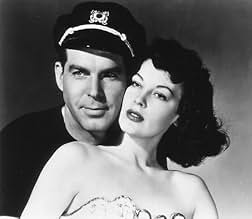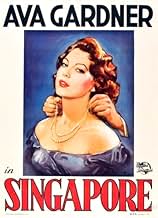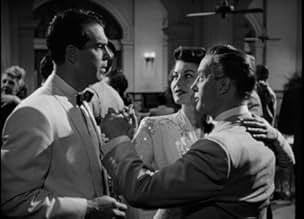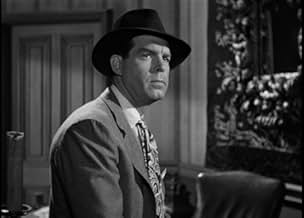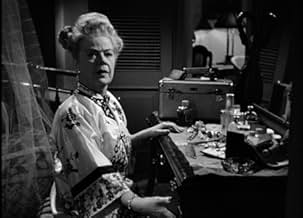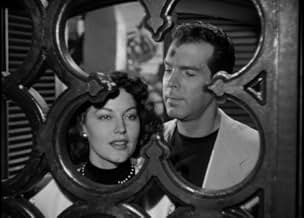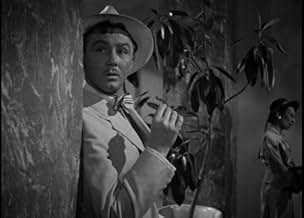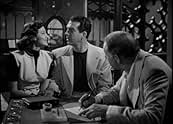Nach dem Zweiten Weltkrieg kehrt ein amerikanischer Kapitän nach Singapur zurück, um seinen versteckten Perlenvorrat zu bergen, und findet seine verlorene Verlobte, die nun an Amnesie leidet... Alles lesenNach dem Zweiten Weltkrieg kehrt ein amerikanischer Kapitän nach Singapur zurück, um seinen versteckten Perlenvorrat zu bergen, und findet seine verlorene Verlobte, die nun an Amnesie leidet.Nach dem Zweiten Weltkrieg kehrt ein amerikanischer Kapitän nach Singapur zurück, um seinen versteckten Perlenvorrat zu bergen, und findet seine verlorene Verlobte, die nun an Amnesie leidet.
Richard Abbott
- Maitre d'
- (Nicht genannt)
Patrick Aherne
- British Officer
- (Nicht genannt)
Philip Ahn
- Jimmy - Bartender
- (Nicht genannt)
Norman Ainsley
- Immigration Official
- (Nicht genannt)
Empfohlene Bewertungen
Before it became the modern miracle of cheerless, nose-to-the-grindstone capitalism, Singapore had a past; in the opening years of the Cold War, it was known as Red City. John Brahm's romantic intrigue, set just before and after World War II, evokes that shady period, using the city-state at the tip of the Maylay peninsula as another Oriental port of intrigue, like Shanghai or Macao.
Fred MacMurray had been a smuggler as the war drew close; when the Japanese attacked, he lost both a fortune in pearls and his fiancee, Ava Gardner, who was presumed killed. Now it's 1946 and, returning to retrieve the pearls he'd hidden, catches sight of Gardner, now married but with no memory of her past -- or theirs. In his quest to restore both pieces of his pre-war bliss, he must overcome multiple obstacles: a shrewed British colonial official; Gardner's possessive, rich husband; and a criminal gang headed by Thomas Gomez, who's also after those pearls.
Though there's a lot packed into it, Singapore's plot stays pretty thin, but Brahm makes the most of what he has to work with. A craftsmanlike if uneven director, he contributed several installments to the noir cycle (Hangover Square, The Locket, the Brasher Doubloon). His work rarely rose to the heights of inspiration reached by fellow European emigres like Fritz Lang, Robert Siodmak or Billy Wilder, and Singapore was his swan song to Hollywood (he ended up in television).
At first glance, it might seem a recipe for folly to team MacMurray with the sultry Gardner. But he had survived being matched against Barbara Stanwyck (and more than once), while her fiery reputation owed more to her off-screen life than to her film roles. So no sparks fly, but the story gets told. Singapore remains a stylish -- Brahm sets those ceiling fans spinning -- if lightweight romantic thriller (all told, it's two or three cuts above John Farrow's somewhat similar Calcutta of the same year).
Fred MacMurray had been a smuggler as the war drew close; when the Japanese attacked, he lost both a fortune in pearls and his fiancee, Ava Gardner, who was presumed killed. Now it's 1946 and, returning to retrieve the pearls he'd hidden, catches sight of Gardner, now married but with no memory of her past -- or theirs. In his quest to restore both pieces of his pre-war bliss, he must overcome multiple obstacles: a shrewed British colonial official; Gardner's possessive, rich husband; and a criminal gang headed by Thomas Gomez, who's also after those pearls.
Though there's a lot packed into it, Singapore's plot stays pretty thin, but Brahm makes the most of what he has to work with. A craftsmanlike if uneven director, he contributed several installments to the noir cycle (Hangover Square, The Locket, the Brasher Doubloon). His work rarely rose to the heights of inspiration reached by fellow European emigres like Fritz Lang, Robert Siodmak or Billy Wilder, and Singapore was his swan song to Hollywood (he ended up in television).
At first glance, it might seem a recipe for folly to team MacMurray with the sultry Gardner. But he had survived being matched against Barbara Stanwyck (and more than once), while her fiery reputation owed more to her off-screen life than to her film roles. So no sparks fly, but the story gets told. Singapore remains a stylish -- Brahm sets those ceiling fans spinning -- if lightweight romantic thriller (all told, it's two or three cuts above John Farrow's somewhat similar Calcutta of the same year).
Singapore is a mix of crime and romance, Matt Gordon has just returned to Singapore from the war, where he reminisces about his lost love who he thought had died during a Japanese bombing.
As a pearl smuggler, he has a second reason to return, hidden pearls that he has stashed in a hotel room and that he hopes to get his hands on again.
When he discovers that his lost love who is believed to be dead, is still alive but has amnesia,and is now married to someone else and no longer knows anything about her past with him, things become a lot more complicated for him.
Fred Macmurray once again in a serious role, and he does it properly, Ava Gardner is again a sight to see, their romance is not very well developed, but who cares.
Great mix between a touch of crime and romance.
As a pearl smuggler, he has a second reason to return, hidden pearls that he has stashed in a hotel room and that he hopes to get his hands on again.
When he discovers that his lost love who is believed to be dead, is still alive but has amnesia,and is now married to someone else and no longer knows anything about her past with him, things become a lot more complicated for him.
Fred Macmurray once again in a serious role, and he does it properly, Ava Gardner is again a sight to see, their romance is not very well developed, but who cares.
Great mix between a touch of crime and romance.
Director John Brahm manages to hold this poor-man's "Casablanca" together. The picture moves at a good clip and Brahm makes the studio-set Singapore visually interesting. There's help too from stars Fred MacMurray and Ava Gardner as lovers whose lives are complicated by World War II and Gardner's amnesia when MacMurray, who thought her dead, finds her again in postwar Singapore, married to a wealthy planter. MacMurray and Gardner are really a goofy romantic team, but MacMurray has his appealing casual charm, and Gardner's vague, unfocused acting works well in some of her amnesiac scenes (plus she was at her most beautiful in the late 1940's). Supporting turns by pros like Richard Haydn and Spring Byington are also a plus. Overall, contrived and derivative, but it looks like a classic compared to the depressing Errol Flynn 1957 remake, "Istanbul."
On her way up the Hollywood ladder MGM loaned Ava Gardner out for this potboiler adventure film Singapore. As the area suggests romance and mystery just the title alone would bring in a few customers at the box office. In fact Singapore still is an area of intrigue though now enjoying a prosperity that could not have been imagined when this film was made.
Fred MacMurray and Ava Gardner are a pair of star crossed lovers who marry just before the Japanese invade and occupy the city. MacMurray has a fortune in pearls that he stashes and while trying to retrieve them the bombs are dropped and he thinks Gardner is killed. He barely gets away in his schooner with other refugees without pearls and without Ava who he married just before the attack.
After the war Fred's back to get his pearls, but he sees Ava now married to Roland Culver and with a bad case of amnesia. And he's got other problems as villains Thomas Gomez and George Lloyd want them as well.
Singapore was created on the Universal back lot and didn't have the advantage that its remake Istanbul had with color and location shooting. But they did make a better film though not all that much better. It's been compared to Casablanca by many to the detriment of Singapore. But those letters of transit that will allow two people, which two to escape and join the fight against Nazism are a much bigger prize than Fred's pearls. You care a lot more about Bogey, Bergman, and Henreid than the triangle here. And this film didn't have As Time Goes By either.
MacMurray and Gardner also don't have the chemistry that Bogey and Bergman do. But that's not fair, who else ever did?
Singapore is your routine potboiler another film MacMurray was grabbing for the paycheck after he left Paramount. As for Ava after The Killers and The Hucksters it was not a step down, but just keeping her on the same career plateau as before.
Fred MacMurray and Ava Gardner are a pair of star crossed lovers who marry just before the Japanese invade and occupy the city. MacMurray has a fortune in pearls that he stashes and while trying to retrieve them the bombs are dropped and he thinks Gardner is killed. He barely gets away in his schooner with other refugees without pearls and without Ava who he married just before the attack.
After the war Fred's back to get his pearls, but he sees Ava now married to Roland Culver and with a bad case of amnesia. And he's got other problems as villains Thomas Gomez and George Lloyd want them as well.
Singapore was created on the Universal back lot and didn't have the advantage that its remake Istanbul had with color and location shooting. But they did make a better film though not all that much better. It's been compared to Casablanca by many to the detriment of Singapore. But those letters of transit that will allow two people, which two to escape and join the fight against Nazism are a much bigger prize than Fred's pearls. You care a lot more about Bogey, Bergman, and Henreid than the triangle here. And this film didn't have As Time Goes By either.
MacMurray and Gardner also don't have the chemistry that Bogey and Bergman do. But that's not fair, who else ever did?
Singapore is your routine potboiler another film MacMurray was grabbing for the paycheck after he left Paramount. As for Ava after The Killers and The Hucksters it was not a step down, but just keeping her on the same career plateau as before.
This film begins with a man by the name of "Matt Gordon" (Fred MacMurray) returning to the city of Singapore not long after the end of World War 2. The main reason for his return is due to the fact that he had hidden a large cache of illegal pearls and he has come to take ownership of them again. Along with that, there was a young woman named "Linda Grahame" (Ava Gardner) who he had to leave behind when the Japanese attacked the city and--even though he believes she was killed during the war--he feels the need to find out. One way or the other. Be that as it may, no sooner does he arrive in Singapore then he is met by a high-ranking member of law enforcement named "Deputy Commissioner Hewitt" (Richard Haydn) who has a professional interest in recovering the illegal pearls. Likewise, a criminal figure by the name of "Mr. Maribus" (Thomas Gomez) who is equally interested in possessing these pearls as well. Yet as much as Matt wants these pearls, his priorities change when he meets Linda again. The problem is, she professes to have never met him. Now, rather than reveal any more, I will just say that this was an interesting movie, more or less, with certain similarities to "Casablanca" being somewhat obvious. To that effect, although both Fred MacMurray and Ava Gardner put in decent performances, I didn't really see much chemistry between them. At least, nothing like Humphrey Bogart and Ingrid Bergman had in the previously mentioned film. Even so, I enjoyed this movie for the most part and I have rated it accordingly. Slightly above average.
Wusstest du schon
- Wissenswertes"Lux Radio Theater" broadcast a 60 minute radio adaptation of the movie on November 3, 1947 with Fred MacMurray and Ava Gardner reprising their film roles
- Zitate
Linda: So let me ruin you fast.
Matt Gordon: How many have you ruined?
Linda: You're my last victim, darling.
- VerbindungenReferenced in Columbo: Mord per Telefon (1978)
- SoundtracksTemptation
(1933)
Music by Nacio Herb Brown (uncredited)
Used throughout the movie as a leitmotif for Linda Grahame
Top-Auswahl
Melde dich zum Bewerten an und greife auf die Watchlist für personalisierte Empfehlungen zu.
- How long is Singapore?Powered by Alexa
Details
- Laufzeit
- 1 Std. 19 Min.(79 min)
- Farbe
- Seitenverhältnis
- 1.37 : 1
Zu dieser Seite beitragen
Bearbeitung vorschlagen oder fehlenden Inhalt hinzufügen


